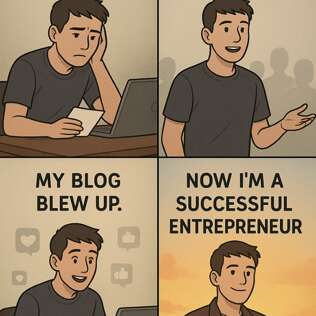She Laughed at His Dream and Ditched Him, then He Rose Like a Phoenix.
They met at a used bookstore, where the air tasted of old paper and possibility. He carried a sketchbook under his arm, a map of inventions that lived more in his head than in the world. She laughed the first time he spoke of it: not a gentle chuckle, but a clear, brittle thing that cut through his sentences and left them ragged. Afterwards she left, suitcase and certainty in hand, convinced his ambitions were the kind of folly that shrinks with day to day life.
Grief came, but it did not arrive as drama. It arrived as a collection of small stones: unpaid bills, a leaking sink that refused to behave, lonely weeks where even the radio felt loud. He could have let those stones become ballast, heavy and immovable. Instead he picked them up one by one and carried them like lessons. There was stubbornness inside him, a stubbornness that smelled faintly of coffee and midnight oil, and it decided, quietly, to keep going.
For months he worked in a small, sweat stained studio above a bakery, where yeast scented mornings softened the edges of long nights. His dream was odd, intricate and not instantly profitable: a company that mended discarded objects, a place where broken things were coaxed back into usefulness with care and imagination. People called it quaint; bankers called it impractical. He listened to those labels like a dog hears a storm, aware, startled, but not defeated.
At first success arrived in crumbs. A neighbor brought a chipped teapot. A local musician handed over a cracked violin. He repaired each object with a mixture of reverence and daring, refusing to hide the scars he left or the history each item carried. Word began to circulate the way good things do when they are unexpected: by mouth, soft and urgent. Someone wrote about him in a small magazine; another customer told a friend who told a friend. The tiny victories multiplied into footfalls.
Yet transformation is not a tidy arc. There were nights when the old doubt returned and curled up like a cat on his chest. Once, during a rainstorm, the studio flooded and several projects were ruined. He sat on the floor, damp socks and teacup beside him, and felt exhaustion edge toward surrender. Then a knock at the door: a young woman, cheeks flushed from the rain, holding a wooden toy that her son could not sleep without. She did not ask for miracles. She asked, simply, whether he would try. That request was the small ember that refused to die.
He began to invite apprentices, people whose circumstances had nudged them toward reinvention: a barista with an eye for color, a retired watchmaker, a teenager who could make soft lamps out of salvaged glass. They worked by instinct and intuition, learning that repair meant listening. Repairs taught them humility; they learned to accept imperfection and to celebrate the unexpected beauty of seams. The studio hummed with talk, with laughter, with music scraped softly from broken strings. It became both workshop and refuge.
The business grew in a way that surprised him: not as a mansion built overnight, but as a village constructed brick by slow brick. He opened a repair café, where people could sip tea while watching a chair find its balance again. He partnered with schools to teach young hands how to mend and not merely discard. People began to speak of his work in terms that went beyond commerce: they spoke of stewardship, of the quiet revolution of caring for things and each other.
When success arrived in a more unmistakable form, a grant, then a gallery invitation, then the curious smile of a publisher, she heard about it. The same person who had laughed became curious, then reflective, then oddly apologetic. She reached out with a message that might as well have been a paper boat on a wide river: short, polite, unsure of its own wake. He read it; he thought about answering; he chose to do something stranger than retaliation. He invited her to visit the workshop, not to gloat, but because he believed in showing the whole story: not the curated triumph, but the faded curtains, the late nights, the people who had believed when belief was the smallest currency they had.
She came, and the moment was neither cinematic nor scandalous. She stood by a table where hands were sewing a torn jacket back into dignity, eyes tracing the path of stitches. For a while she said nothing. Then her voice softened; she said she had been wrong to laugh, that she had been afraid, not brave. There was a realness in her apology, a vulnerability that asked for nothing.
He forgave, but forgiveness here was not a flourish. It was a choice made of quiet gravity. He had no need to reframe his life into a morality tale. He had grown because he had allowed himself to be broken and then remade; he had risen not to spite, but to prove to himself that a dream can be a steady thing when tended.
In the end the phoenix image was literal and not: flames were not required. He rose from his own ash, yes, but those ashes were the remnants of a life that no longer fit him: the fear, the smallness, the voices that told him to stop. From those remains he built something both practical and luminous: a place where discarded things and overlooked people found their way back into usefulness and joy. His ascent was measured in repaired handles and mended hearts, in apprentices who found work that fed them, in neighbors who learned to value what they had.
People came for objects and left with stories. Children learned to fix, adults relearned patience, and somewhere between the clinking of tools and the steam of the kettle, he found the steadiness that once seemed impossible. He did not become famous to headline tabloids; he became essential to his community. That quiet necessity felt like victory, perhaps the truest kind.
She watched him change, and in watching she changed herself. The last time they spoke it was by the doorway of the workshop, late afternoon light making the dust motes look like tiny planets. No tearing laughter, no theatrical exit. Just two people, older in ways that mattered, understanding that the bravest thing is to stay with what you choose, to tend it, to let it transform you.
He smiled, a private, unshowy smile, and turned back to his work. The world did not explode. It settled, instead, into something sturdier: proof that dreams, when defended with patience and craft, don't perish at the first scoff. They transmogrify; they become the tools we use to rebuild ourselves.

